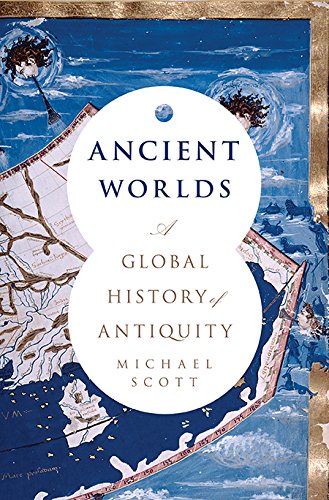About this item
"As panoramic as it is learned, this is ancient history for our globalized world."Tom Holland, author of Dynasty and RubiconTwenty-five-hundred years ago, civilizations around the world entered a revolutionary new era that overturned old order and laid the foundation for our world today. In the face of massive social changes across three continents, radical new forms of government emerged; mighty wars were fought over trade, religion, and ideology; and new faiths were ruthlessly employed to unify vast empires. The histories of Rome and China, Greece and India-the stories of Constantine and Confucius, Qin Shi Huangdi and Hannibal-are here revealed to be interconnected incidents in the midst of a greater drama.In Ancient Worlds, historian Michael Scott presents a gripping narrative of this unique age in human civilization, showing how diverse societies responded to similar pressures and how they influenced one another: through conquest and conversion, through trade in people, goods, and ideas. An ambitious reinvention of our grandest histories, Ancient Worlds reveals new truths about our common human heritage."A bold and imaginative page-turner that challenges ideas about the world of antiquity."Peter Frankopan, author of The Silk Roads
About the Author
Michael Scott
"Some stories wait their turn to be told, others just tap you on the shoulder and insist you tell them."By one of those wonderful coincidences with which life is filled, I find that the first time the word alchemyst--with a Y--appears in my notes is in May 1997. Ten years later, almost to the day, The Alchemyst, the first book in the Nicholas Flamel series, will be published in May.Every writer I know keeps a notebook full of those ideas, which might, one day, turn into a story. Most writers know they will probably never write the vast majority of those ideas. Most stories wait their turn to be told, but there are a few which tap you on the shoulder and insist on being told. These are the stories which simply will not go away until you get them down on paper, where you find yourself coming across precisely the research you need, or discovering the perfect character or, in my case, actually stumbling across Nicholas Flamel's house in Paris. Discovering Flamel's house was the final piece I needed to put the book together. It also gave me the character of Nicholas Flamel because, up to that point, the book was without a hero. And Nicholas Flamel brought so much to the story.Nicholas Flamel was one of the most famous alchemists of his day. He was born in 1330 and earned his living as a bookseller, which, by another of those wonderful coincidences, was the same job I had for many years. One day he bought a book, the same book mentioned in The Alchemyst: the Book of Abraham. It, too, really existed and Nicholas Flamel left us with a very detailed description of the copper-bound book. Although the book itself is lost, the illustrations from the text still exist. Accompanied by his wife Perenelle, Nicholas spent more than 20 years trying to translate book. He must have succeeded. He became extraordinarily wealthy and used some of his great wealth to found hospitals, churches, and orphanages. Perhaps he had discovered the secret of the Philosopher's Stone: how to turn base metal into gold.Of course the greatest mystery linked to Nicholas Flamel is the story of what happened after he died. When his tomb was opened by thieves looking for some of his great wealth, it was found to be empty. Had Nicholas and Perenelle Flamel been buried in secret graves, or had they never died in the first place? In the months and years to follow, sightings of the Flamels were reported all over Europe. Had Nicholas also discovered that other great mystery of alchemy: the secret of immortality? What writer couldn't resist a story that combined magical books, an immortal magician and grave robbing and, even more excitingly, that had a basis in fact? It begged the questions: if he was still alive today, where would he be and what would he be doing? Obvious really--he would be running a bookshop in San Francisco.The Alchemyst was a tough book to write, probably the toughest of all the books I've done so far. It is the first in a series, and bec
More about
Michael Scott »
Report incorrect product information.


